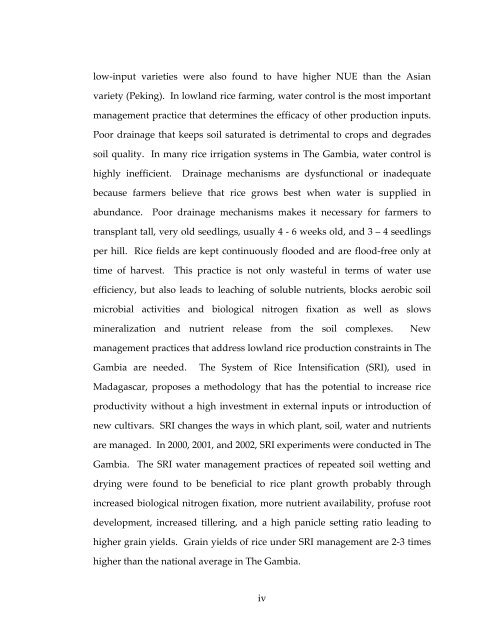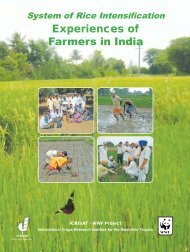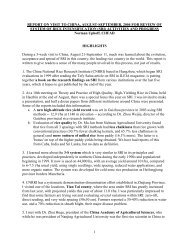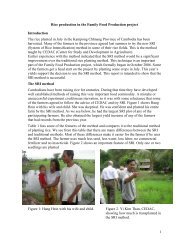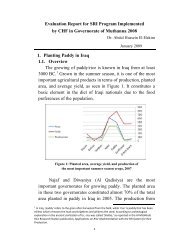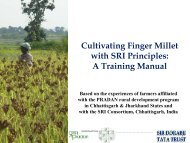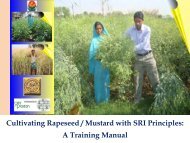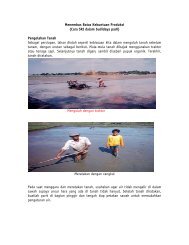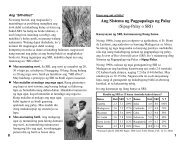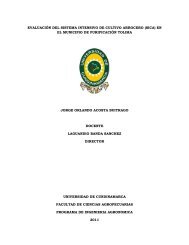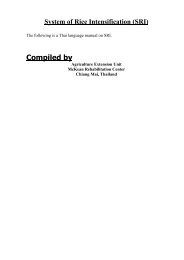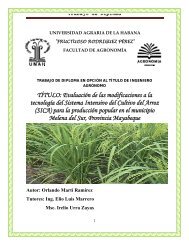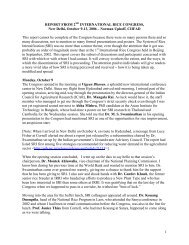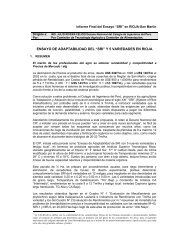Management of rice production systems to increase productivity
Management of rice production systems to increase productivity
Management of rice production systems to increase productivity
You also want an ePaper? Increase the reach of your titles
YUMPU automatically turns print PDFs into web optimized ePapers that Google loves.
low‐input varieties were also found <strong>to</strong> have higher NUE than the Asian<br />
variety (Peking). In lowland <strong>rice</strong> farming, water control is the most important<br />
management practice that determines the efficacy <strong>of</strong> other <strong>production</strong> inputs.<br />
Poor drainage that keeps soil saturated is detrimental <strong>to</strong> crops and degrades<br />
soil quality. In many <strong>rice</strong> irrigation <strong>systems</strong> in The Gambia, water control is<br />
highly inefficient. Drainage mechanisms are dysfunctional or inadequate<br />
because farmers believe that <strong>rice</strong> grows best when water is supplied in<br />
abundance. Poor drainage mechanisms makes it necessary for farmers <strong>to</strong><br />
transplant tall, very old seedlings, usually 4 ‐ 6 weeks old, and 3 – 4 seedlings<br />
per hill. Rice fields are kept continuously flooded and are flood‐free only at<br />
time <strong>of</strong> harvest. This practice is not only wasteful in terms <strong>of</strong> water use<br />
efficiency, but also leads <strong>to</strong> leaching <strong>of</strong> soluble nutrients, blocks aerobic soil<br />
microbial activities and biological nitrogen fixation as well as slows<br />
mineralization and nutrient release from the soil complexes. New<br />
management practices that address lowland <strong>rice</strong> <strong>production</strong> constraints in The<br />
Gambia are needed. The System <strong>of</strong> Rice Intensification (SRI), used in<br />
Madagascar, proposes a methodology that has the potential <strong>to</strong> <strong>increase</strong> <strong>rice</strong><br />
<strong>productivity</strong> without a high investment in external inputs or introduction <strong>of</strong><br />
new cultivars. SRI changes the ways in which plant, soil, water and nutrients<br />
are managed. In 2000, 2001, and 2002, SRI experiments were conducted in The<br />
Gambia. The SRI water management practices <strong>of</strong> repeated soil wetting and<br />
drying were found <strong>to</strong> be beneficial <strong>to</strong> <strong>rice</strong> plant growth probably through<br />
<strong>increase</strong>d biological nitrogen fixation, more nutrient availability, pr<strong>of</strong>use root<br />
development, <strong>increase</strong>d tillering, and a high panicle setting ratio leading <strong>to</strong><br />
higher grain yields. Grain yields <strong>of</strong> <strong>rice</strong> under SRI management are 2‐3 times<br />
higher than the national average in The Gambia.<br />
iv


